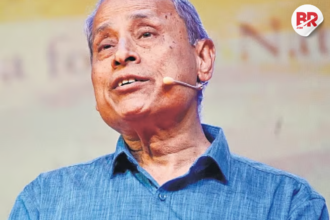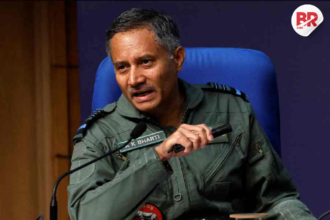
Ashok Khemka: The Bureaucrat Who Refused to Compromise
Ashok Khemka’s name is not just another in India’s bureaucratic circles—it’s a symbol of integrity, courage, and sacrifice.

Over his 34 years in the Indian Administrative Service (IAS), Khemka became known for his fearless battle against corruption.
He was transferred an extraordinary 57 times—an unusual feat that makes his story not just one of career progression, but of defiance in the face of a system that often punishes honesty. When he retired on April 30th, his legacy was far from over.
Khemka’s fight is a reminder of the cost of doing what’s right in a world where doing so is often not the easy choice.
After 33 years, 57 transfers, and a career marked by courage, IAS officer Ashok Khemka retires — not quietly, but with a legacy that echoes far beyond government corridors.
They moved him every time he stood up. Every time he questioned power. Every time he chose what was right… pic.twitter.com/xzitfAunb2
— The Better India (@thebetterindia) April 30, 2025
A Career Marked by Disruption
For Khemka, career advancement wasn’t about titles or status—it was about standing up against a corrupt system.
Every transfer Khemka faced wasn’t just administrative—it was a consequence of his attempts to expose land scams, procurement irregularities, and other corrupt practices within the bureaucracy. His job wasn’t to fit in; it was to disrupt.
Imagine starting a new job every six months. That was Khemka’s reality. Each new posting meant navigating through complex departments while being met with pushback from the system he sought to reform.
And it wasn’t just a matter of new office politics—Khemka was fighting the very forces of corruption that kept the system running smoothly for those in power.
Also Read Supreme Court Denies Bail to Ex-IPS Officer Sanjiv Bhatt in 1990 Custodial Death Case
The Personal Cost of Fighting for Integrity
While Khemka’s commitment to honesty is inspiring, the human toll of such a career is undeniable. Constant transfers and shifting roles make it nearly impossible to establish stability in one’s personal life. Family life, friendships, and home-building became secondary to his mission.
This begs an important question: Why are officers like Khemka, who dedicate themselves to exposing corruption, often punished rather than rewarded? What kind of system discourages integrity and honesty? It’s a question that still hangs heavy over India’s bureaucracy.
Key Lessons from Khemka’s Journey
Ashok Khemka’s journey isn’t just a story of one man’s battle against corruption—it’s a guidebook for anyone who wants to make a difference in the world.
- Integrity Matters: In a world where shortcuts are often rewarded, Khemka’s unwavering commitment to his principles is a reminder that doing the right thing is worth the cost. Even when faced with immense pressure, he refused to compromise.
- Resilience is Crucial: Imagine being uprooted again and again, facing resistance and even isolation. It would break most people. But Khemka showed that true resilience isn’t about avoiding setbacks—it’s about how you bounce back, no matter how hard the fall.
- Speaking Truth to Power Has a Price: Khemka’s career proves that challenging the system can cost you dearly, but his story also shows that one person’s courage can create ripples of change.
Protecting Integrity in the Bureaucracy
As Khemka steps into retirement, his story begs the question: How do we ensure that officers who fight corruption aren’t punished for their honesty? Here’s what needs to change:
- Strengthen Whistleblower Protection Laws: To protect officers like Khemka, we need stronger safeguards for those who expose corruption.
- Transparent Transfer Policies: Officers shouldn’t be penalized or moved out for doing the right thing. Transparent, fair policies will help ensure they aren’t punished for their integrity.
- Cultivate a Culture of Accountability: Bureaucracy should celebrate honesty and integrity, not punish it. We need a system where truth-tellers aren’t outcast but are hailed as heroes.
Though Ashok Khemka has retired, his legacy is just beginning. His fight against corruption serves as an inspiration to both future civil servants and ordinary citizens.
His career wasn’t about personal gain—it was about making sure that India’s bureaucracy would one day be held to the standards of honesty, transparency, and integrity.
Khemka may have faced immense hardships, but his story proves that one person can make a difference—even against impossible odds.
Also Read Haryana Police Sees Sudden Shake-Up: 55 Officers Moved in Overnight Reshuffle












